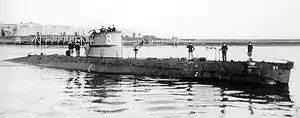HMS H6
HMS H6 was a British H-class submarine of the Royal Navy built by Canadian Vickers & Co. during World War I.
 HNLMS O 8 | |
| History | |
|---|---|
| Builder: | Canadian Vickers |
| Launched: | 10 June 1915 |
| Fate: | Sold to the Netherlands, 4 May 1917 |
| Name: | Hr.Ms. O 8 |
| Acquired: | 4 May 1917 |
| Fate: | Scuttled by Dutch Forces following German invasion of the Netherlands during Second World War. Later refloated by Germany |
| Name: | UD-1 |
| Decommissioned: | 23 November 1943 |
| Fate: | Scuttled in Kiel Harbour following Allied advance, 3 May 1945 |
| General characteristics (as built) | |
| Class and type: | H-class submarine |
| Displacement: |
|
| Length: | 150 ft 3 in (45.80 m) |
| Beam: | 15 ft 4 in (4.67 m) |
| Propulsion: |
|
| Speed: |
|
| Range: |
|
| Complement: | 22 |
| Armament: |
|
History
She was completed on 10 June 1915 and was commissioned by the Royal Navy the same year. However, her service in the Royal Navy was short. On 19 January 1916, she ran aground near the Dutch island of Schiermonnikoog, after which she was interned by the Dutch Navy. On 4 May 1917, an agreement was reached to sell H6 to the Netherlands.
Dutch Service
The Dutch Navy renamed H6 HNLMS O 8 and refitted her, with knowledge gained from the interned German submarine UC-8. After UC-8 was bought from Germany O 8 was equipped with UC-8's Zeiss periscope. During maintenance in October 1921, O 8 sank in the harbour at Den Helder. Because only minor damage was sustained, she was repaired and continued in service. In the summer of 1925, O 8 together with the other Dutch vessels K XI, Jacob van Heemskerck, Maarten Harpertszoon Tromp, Z 3 and Z 5 were part of an exercise in the Baltic Sea.
During the German attack on the Netherlands at the start of the Second World War, O 8 was still in Dutch service. Because of her age, it was decided to scuttle her.
German Service
After the surrender of the Netherlands, the German forces were able raise O 8 and found her almost fully intact.[1]
Germany took O 8 into service as UD-1 and transferred her from Den Helder to Kiel. In Kiel, she was used as training ship to train crews for the German U-boats. Because of her age, she was decommissioned on 23 November 1943. On 3 May 1945, she was scuttled again in the harbour at Kiel.[2]
References
- Bezemer, K.W.L.; Zij vochten op de zeven zeeën; Uitgeversmaatschappij W. de Haan N.V.; 1954
- Dutchsubmarines.com O 8
Bibliography
- Busch, Rainer; Röll, Hans-Joachim (1999). German U-boat commanders of World War II : a biographical dictionary. Translated by Brooks, Geoffrey. London, Annapolis, Md: Greenhill Books, Naval Institute Press. ISBN 1-55750-186-6.
- Busch, Rainer; Röll, Hans-Joachim (1999). Deutsche U-Boot-Verluste von September 1939 bis Mai 1945 [German U-boat losses from September 1939 to May 1945]. Der U-Boot-Krieg (in German). IV. Hamburg, Berlin, Bonn: Mittler. ISBN 3-8132-0514-2.
- Gröner, Erich; Jung, Dieter; Maass, Martin (1991). U-boats and Mine Warfare Vessels. German Warships 1815–1945. 2. Translated by Thomas, Keith; Magowan, Rachel. London: Conway Maritime Press. ISBN 0-85177-593-4.
- Jalhay, P.C.; Wijn, J.J.A. (1997). Ik nader ongezien! De onderzeeboten van de Koninklijke Marine. Amsterdam: De Bataafsche Leeuw. ISBN 9067074624.
